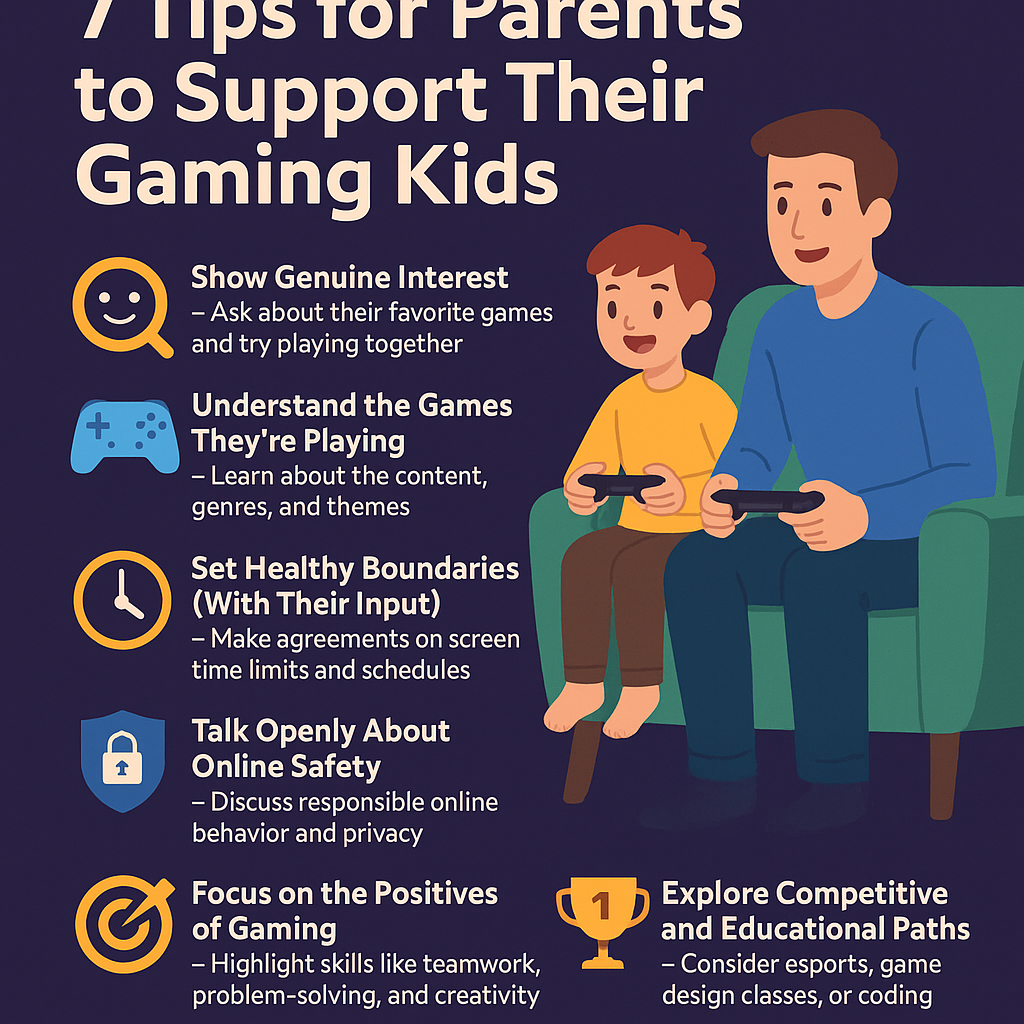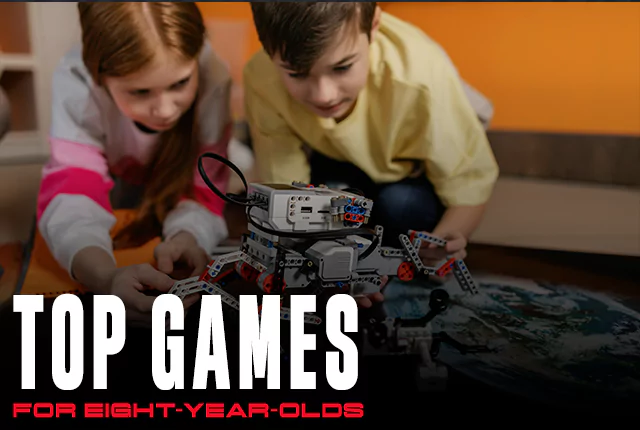Leveling Up Together: 7 Tips for Parents to Support Their Gaming Kids

Leveling Up Together: 7 Tips for Parents to Support Their Gaming Kids
🎮 Why Supporting Your Gaming Kid Matters
Gaming isn’t just a hobby—it’s a culture, a social activity, and in some cases, even a career path. While it might seem like “just screen time,” today’s gaming landscape includes teamwork, creativity, strategy, and communication.
For many kids, video games are a place to:
- Make friends
- Express themselves
- Escape stress
- Compete or collaborate in team settings
- Explore storytelling and design
As a parent, your support can turn gaming from an isolating activity into a positive, enriching part of their development.
👨👩👧👦 1. Show Genuine Interest
You don’t need to become a pro at Fortnite or memorize every Pokémon—but showing curiosity goes a long way. Ask questions like:
- “What do you like most about this game?”
- “Can you teach me how to play?”
- “Who do you usually play with?”
Even sitting beside them while they play can spark conversation and trust.
🕵️ 2. Understand the Games They’re Playing
Every game is different. A battle royale like Apex Legends has a vastly different purpose than a creative builder like Minecraft or a story-driven game like Undertale.
Here’s how to get informed:
- Look up game summaries on Common Sense Media or IGN.
- Watch a YouTube Let’s Play or Twitch stream.
- Ask your child to explain what they’re doing and why they enjoy it.
Understanding context helps you distinguish between harmful content and harmless fun.
⏱️ 3. Set Healthy Boundaries (With Their Input)
Instead of setting rigid rules, try collaborative agreements:
- “Let’s agree on 1.5 hours per school night, with 15 minutes’ notice before shutting off.”
- “Homework and chores come first—then you can game.”
- “No gaming past 9 PM so you get enough sleep.”
Kids are more likely to respect boundaries they helped create. Use tools like parental controls on Xbox, PlayStation, or Switch to support time limits without constant nagging.
🛡️ 4. Talk Openly About Online Safety
If your child plays online multiplayer games, make sure they understand:
- Never share real names, locations, or passwords.
- Be wary of strangers who ask to move to other platforms (like Discord).
- How to block or report toxic players.
Encourage them to tell you if something feels off. No punishment—just open dialogue.
🎯 5. Focus on the Positives of Gaming
Here’s what gaming can develop:
- Teamwork & communication (Overwatch, Rocket League)
- Strategic thinking & problem-solving (Zelda, Portal)
- Creativity & design (Minecraft, Terraria)
- Resilience & perseverance (getting past difficult levels)
Reframe gaming as skill-building. Just like sports or music, it has growth potential when done right.
🏆 6. Explore Competitive and Educational Paths
Is your kid really into gaming? Consider:
- Esports clubs at school or local gaming tournaments
- Streaming or content creation (with parental guidance)
- Game design or coding classes (like Roblox Studio or Unity tutorials)
Some universities now offer esports scholarships, and game development is a booming industry. Passion can become profession.
🤝 7. Game Together
Gaming together builds a bridge between worlds. Choose age-appropriate co-op or competitive titles like:
- Mario Kart 8 Deluxe
- Overcooked 2
- Stardew Valley
- Lego Star Wars
- Rocket League
You don’t have to be good at it—your willingness to play is what matters.
🚦 Bonus: Red Flags to Watch For
While gaming is mostly healthy, here are some warning signs to monitor:
- Extreme irritability when asked to stop
- Skipping meals, sleep, or social activities
- Sudden decline in school performance
- Obsessive behavior around loot boxes or microtransactions
If these appear, don’t panic. Discuss concerns openly and consider help from a child psychologist familiar with gaming culture.
🧠 Final Thoughts
Supporting your gaming kid isn’t about control—it’s about connection. The more you engage with their interests, the more trust and balance you’ll build together.
Gaming can be a powerful part of your child’s development when guided with empathy, curiosity, and healthy boundaries.
👾 For more parenting and gaming insights, visit heet.gg
Recommended
The 5 Most Expensive Pokémon Cards Ever Sold (and Why They’re Worth a Fortune)
3 months ago
10 Fantasy Co-Op Games to Embark on Epic Quests With Friends (2025 Edition)
3 months ago
10 Relaxing Puzzle Games to Play Before Bed
1 month ago
Game like A Pro, 10 Gaming Tips To Level Up Your Skills
7 months ago
How Gaming Brings People Together
7 months ago

